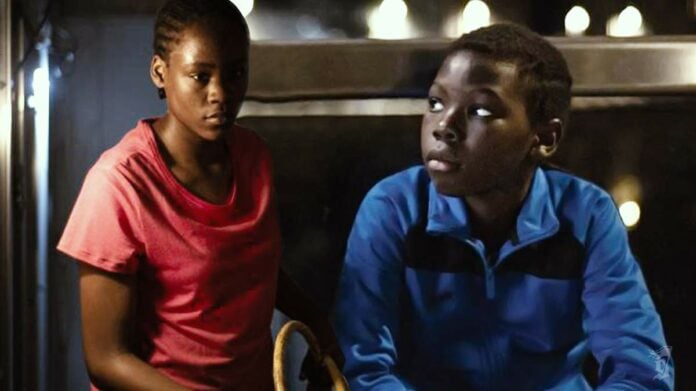“Tori and Lokita,” the story of two kids trying to secure their refugee status in Belgium, begins with a desperate, unsalvageable hopelessness. It is difficult to conceive how a film with a nearly unbearably bleak premise manages to dip further into tragedy, but this one does: hope sinks like a stone as the story unfolds. In line with the genre conventions of social realism, the film seems to omit any form of stylization. The costumes and sets refuse to stand out; they refuse beauty. The acting and the dialogue, too, convey only what they are meant to, with no digression and no extra expression beyond what is necessary to the story and to the characters.
Eleven-year-old Tori (Pablo Schils) and sixteen-year-old Lokita (Joely Mbundu) are two kids who met on a boat as they fled to Belgium and pretended to be siblings in order to secure their refugee status there. The story first follows their day as they try to get through the interviews to prove Lokita really is Tori’s sister, sing to entertain customers in a pizza restaurant, then sell drugs for the owner who sexually assaults Lokita. There is an overwhelming sense as the audience gets a glimpse into their world of sadness as well as boredom. Cinematographer Benoît Dervaux’s use of the handheld camera, as seen when Lokita goes to a center to send money to her mother, adds to the sense of ordinariness and mundanity. The world is depicted as being so close to real life that it is nearly uninteresting to watch, even though, in the same scene, Lokita is quickly and suddenly pulled into a car and forced to hand over the money to a church elder who demands a trafficking fee.
All the odds are already against Lokita; her situation is already bleak and seemingly impossible until she is sent to work on a cannabis farm, isolated in a hot, claustrophobic bunker. The whole time Mbundu is a picture of tragic calmness; her body language gives almost nothing away, even in the throes of a panic attack, quietly signifying a character well-practiced in hiding truths about themselves. What finally breaks her is being told she won’t be able to reach Tori while on the farm’s secret location. This is where the drama really begins: It becomes clear that the story is not about trying to secure the right papers, not really. Tori is Lokita’s reason for fighting and trying to stay standing until the very end in a world that repeatedly and relentlessly knocks her down. The sophistication of the filmmaking lies in the very careful balance that directors Luc Dardenne and Jean-Pierre Dardenne derive between unforgiving, hopeless life circumstances and the extraordinary capacity that human beings have for hope. In a lot of ways, the film attempts to understand what keeps a person going when everything seems (or is) lost.
Tori has had to grow up too quickly. He often inhabits the role of the protective, wise sibling, giving Lokita her pills when she has a panic attack, putting in her new SIM card, stopping her from hurting herself, and cleaning her wounds. He is the active character who finds her hidden location and breaks her out, while Lokita grits her teeth and bears the slings and arrows that life throws at her. Everything they do—the roles they take on as active or passive—is to protect the other because the other cannot do what they are doing. Schils and Mbundu are nearly serene in their perfect embodiment of these characters and dynamics. The endless grief and pain are fighting with their desperation to hold on and move towards a dwindling light at the end of the tunnel. The first-time actors hold that pain and that light in their eyes.
In spite of having all the right elements, “Tori and Lokita” is not the easiest movie-watching experience. A lot of the shots are claustrophobic and slow, which, though clearly intentional, make it difficult not to reach for one’s phone and check for messages every once in a while. The climax is also a tad convenient, which distances the audience a little from the dedication to the reality that the film adheres to until that point. That being said, the film is still incredibly successful in tapping into the audience’s empathy, which leads to the viewer often feeling heartbroken and bored at the same time.
The Dardenne brothers are well known for writing stories about social injustices, each film angrier than the last. “Tori and Lokita” was born from the devastating reality that unaccompanied, exiled minors face as they, unanchored and all alone, slip into the shadows and go unnoticed too easily and for too long. This causes new kinds of loneliness that cause illnesses previously unknown, and in this world, Tori and Lokita find immunity in each other. This idea shines in the creative decision to have no music in the film whatsoever, apart from the songs that the pair sing together or to each other. The stakes are undeniably higher than individual life and death. They symbolize a future for the world, and it is a bleak one if we refuse to see those who have been pushed and forced to hide in the shadows.

